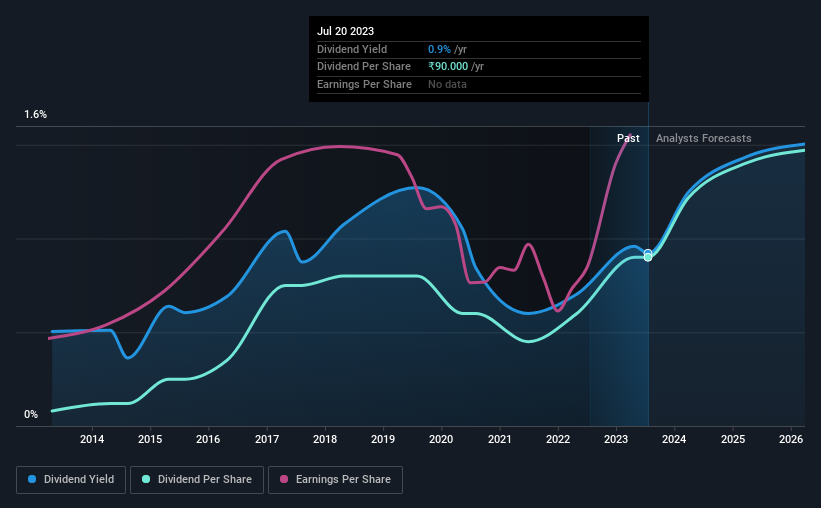Maruti Suzuki India (NSE:MARUTI) Is Paying Out A Larger Dividend Than Last Year

The board of Maruti Suzuki India Limited (NSE:MARUTI) has announced that it will be paying its dividend of ₹90.00 on the 6th of September, an increased payment from last year's comparable dividend. This takes the annual payment to 0.9% of the current stock price, which unfortunately is below what the industry is paying.
See our latest analysis for Maruti Suzuki India
Maruti Suzuki India's Dividend Is Well Covered By Earnings
While yield is important, another factor to consider about a company's dividend is whether the current payout levels are feasible. However, based ont he last payment, Maruti Suzuki India was earning enough to cover the dividend pretty comfortably. The business is earning enough to make the dividend feasible, but the cash payout ratio of 94% shows that most of the cash is going back to the shareholders, which could constrain growth prospects going forward.
The next year is set to see EPS grow by 59.9%. If the dividend continues along recent trends, we estimate the payout ratio will be 23%, which is in the range that makes us comfortable with the sustainability of the dividend.

Dividend Volatility
While the company has been paying a dividend for a long time, it has cut the dividend at least once in the last 10 years. Since 2013, the dividend has gone from ₹8.00 total annually to ₹90.00. This works out to be a compound annual growth rate (CAGR) of approximately 27% a year over that time. Maruti Suzuki India has grown distributions at a rapid rate despite cutting the dividend at least once in the past. Companies that cut once often cut again, so we would be cautious about buying this stock solely for the dividend income.
Maruti Suzuki India May Find It Hard To Grow The Dividend
With a relatively unstable dividend, it's even more important to evaluate if earnings per share is growing, which could point to a growing dividend in the future. Unfortunately, Maruti Suzuki India's earnings per share has been essentially flat over the past five years, which means the dividend may not be increased each year. While EPS growth is quite low, Maruti Suzuki India has the option to increase the payout ratio to return more cash to shareholders.
In Summary
Overall, we always like to see the dividend being raised, but we don't think Maruti Suzuki India will make a great income stock. The company hasn't been paying a very consistent dividend over time, despite only paying out a small portion of earnings. We would be a touch cautious of relying on this stock primarily for the dividend income.
Investors generally tend to favour companies with a consistent, stable dividend policy as opposed to those operating an irregular one. Still, investors need to consider a host of other factors, apart from dividend payments, when analysing a company. For instance, we've picked out 1 warning sign for Maruti Suzuki India that investors should take into consideration. Looking for more high-yielding dividend ideas? Try our collection of strong dividend payers.
New: Manage All Your Stock Portfolios in One Place
We've created the ultimate portfolio companion for stock investors, and it's free.
• Connect an unlimited number of Portfolios and see your total in one currency
• Be alerted to new Warning Signs or Risks via email or mobile
• Track the Fair Value of your stocks
Have feedback on this article? Concerned about the content? Get in touch with us directly. Alternatively, email editorial-team (at) simplywallst.com.
This article by Simply Wall St is general in nature. We provide commentary based on historical data and analyst forecasts only using an unbiased methodology and our articles are not intended to be financial advice. It does not constitute a recommendation to buy or sell any stock, and does not take account of your objectives, or your financial situation. We aim to bring you long-term focused analysis driven by fundamental data. Note that our analysis may not factor in the latest price-sensitive company announcements or qualitative material. Simply Wall St has no position in any stocks mentioned.
About NSEI:MARUTI
Maruti Suzuki India
Engages in the manufacture, purchase, and sale of motor vehicles, components, and spare parts primarily in India.
Excellent balance sheet average dividend payer.


